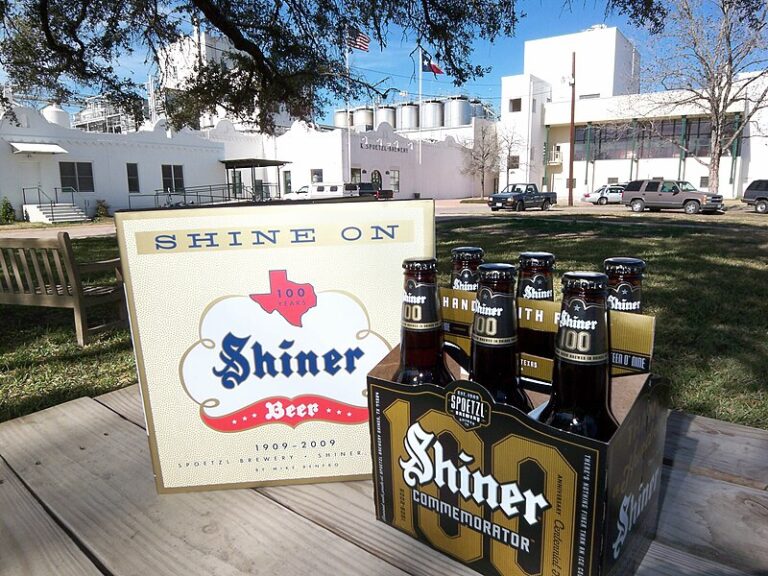Shiner Beer began in 1909 when German and Czech immigrants created a brewery in tiny Shiner, Texas (population roughly 2,000). When Bavarian-trained brewmaster Kosmos Spoetzl arrived in 1914, he elevated the local brew with authentic European techniques. Despite Prohibition and the Depression, Shiner persevered, with its signature Bock becoming a Texas tradition. Today, this small-town beer has grown from regional favorite to one of the nation’s largest craft brewers, while maintaining its authentic roots and independent spirit.
From Immigrant Vision to Texas Icon: The Birth of Shiner Brewing Association
In the heart of Texas, where German and Czech immigrants sought to recreate the flavors of their homeland, the Shiner Brewing Association emerged in 1909 as a monument to old-world brewing traditions. These Bohemian settlers, tired of importing beer by rail from distant cities, built a modest tin shed over a pristine artesian water source they’d discovered in Shiner.
Under first brewmaster Herman Weiss, the fledgling operation confronted early brewing challenges including spoilage issues from inadequate fermentation and refrigeration. Despite these obstacles, the brewery persevered, producing traditional beer reminiscent of European homelands. Much like Scholz Garten, they created a familiar social space where immigrant communities could gather and celebrate their cultural heritage. The brewery’s fortunes changed when Kosmos Spoetzl joined as brewmaster in 1914 and later acquired ownership of the operation. This determination established the foundation for what would become Texas’s oldest independent brewery and a cultural touchstone for generations.
Kosmos Spoetzl’s Legacy: The Bavarian Who Transformed Texas Beer
A brewing revolution arrived in Texas when Kosmos Spoetzl, a formally trained Bavarian brewmaster, took the reins of the Shiner Brewing Association in 1914. His extensive brewing expertise, developed through formal schooling and international experience—including a stint brewing in Egypt—elevated Shiner Beer’s quality immediately.
When Prohibition threatened the brewery’s existence, Spoetzl’s community commitment shined as he pivoted to producing ice and near beer to keep the doors open. After purchasing the brewery in 1915, he renamed it after himself while wisely maintaining the Shiner brand. The brewery has demonstrated remarkable longevity with a small, storied line of brewmasters guiding its beers across generations.
Until his death in 1950, Spoetzl infused authentic Bavarian traditions into Texas brewing culture, creating a legacy that his daughter Cecilie (“Celie”) Spoetzl would continue, ensuring the family’s brewing heritage lived on. Like Luby’s cafeterias that would later define Texas comfort food, Shiner became an iconic part of Texas cultural identity that residents proudly embraced as their own.
Surviving Prohibition and Depression: How Shiner Persevered
The resilience of Shiner Beer during America’s darkest economic periods stands as evidence of both the brewery’s adaptability and the loyalty of its customers. When many Texas breweries shuttered permanently, Spoetzl’s pragmatic leadership decisions kept the operation alive through:
-
Diversifying product lines by selling “near beer” and other legal alternatives during Prohibition
-
Maintaining low overhead costs while adjusting to consumer needs during the Depression
-
Preserving local distribution networks, with Kosmos himself delivering beer by Model T truck after Repeal
Unlike competitors who gambled on national expansion, Shiner focused on its Central Texas roots, particularly in Austin. This regional strategy, combined with family leadership that passed from Kosmos to his daughter Cecilie, guaranteed the brewery’s survival when others failed. Shiner was one of dozens of Texas breweries prior to Prohibition, making its continued existence all the more remarkable. The brewery’s endurance paralleled Texas’s economic transformation following the Spindletop oil gusher of 1901, which brought newfound wealth to many potential customers across the state.
The Signature Shiner Bock: A Century-Old Texas Tradition
While Shiner’s survival through economic hardship proved its resilience, the beer that became synonymous with Texas brewing emerged from these challenging times to create a legacy all its own.
Shiner Bock, first brewed in 1913, originated as a seasonal Lenten beer following Bavarian tradition. What started as a specialty for German and Czech immigrants evolved into Texas’s iconic craft brew. The beer’s distinctive taste comes from its artesian water source discovered in Shiner, complemented by a rich roasted malt character that gives it those signature caramel notes.
Though initially brewed only in spring, growing demand transformed it into a year-round offering by the 1970s (notably 1973). Spoetzl’s German brewing expertise helped perfect the recipe that now represents a majority share of the brewery’s production. Today, this small-town creation stands as a hallmark product of Texas’s oldest independent brewery. The company has maintained strong community involvement by sponsoring local events like chili cook-offs and festivals throughout its history.
Small-Town Roots, National Reach: How Shiner Beer Became a Cultural Phenomenon
Despite its humble beginnings in a Texas town of just 2,000 residents, Shiner has transformed from a local immigrant brew into a national craft-beer phenomenon that captures the American imagination.
The brewery’s remarkable growth from a tiny footprint to nationwide distribution demonstrates effective craft-beer marketing strategies that balance heritage with contemporary appeal. You’ll notice three key factors driving this success:
-
Authentic positioning as a small-town brew competing against corporate giants
-
Strategic product diversification with multiple year-round and seasonal offerings
-
Competitive pricing that delivers craft quality without premium costs
While expanding to all 50 states, Shiner maintains its community roots—brewing every drop in Shiner, Texas—creating an iconic brand that resonates with beer lovers nationwide. The Spoetzl Brewery, which produces Shiner Beer, accelerated its trajectory under new ownership in 1989 (The Gambrinus Company), with production surpassing 100,000 barrels by 1994 as the brand’s popularity surged.


